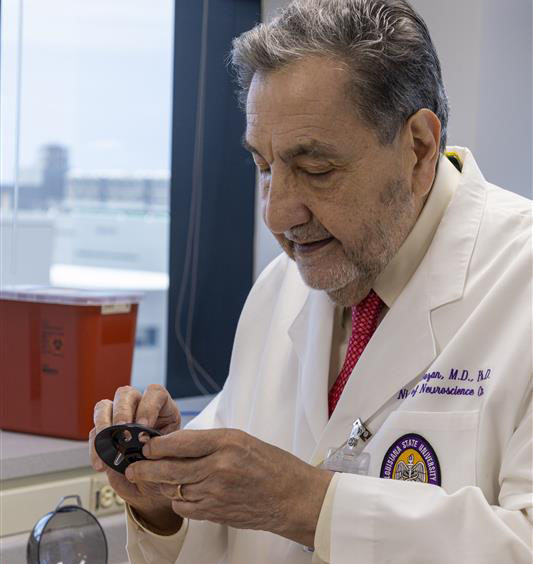LSU Research Bites: Feeding Gut Microbes Fiber Could Be Key to Slowing Alzheimer’s Disease
November 06, 2025
In the past decade, an increasing number of research studies have hinted at a connection between gut issues and the risk of dementia, including Alzheimer’s disease.
Just last year, findings published in the Nature Journal Scientific Reports suggested that even without noticeable symptoms, gut inflammation could contribute to Alzheimer’s disease by traveling to the brain. The good news? There may be a simple way to fix a leaky gut and other intestinal sources of brain inflammation: Eat more fiber!




The gut harbors a vast array of microorganisms, such as bacteria. In fact, there are more bacteria in your gut than there are cells in the rest of your body. Some gut microbes are beneficial, protecting your immune and brain health, while others are harmful. Many of the beneficial microbes can only survive if you feed them through dietary fiber that your body wouldn’t otherwise be able to digest.

Dr. Nicolás Bazan, Boyd Professor of Neuroscience at LSU Health New Orleans and founding director of the LSU Neuroscience Center
In a new study published in the Nature journal Scientific Reports, Dr. Nicolas Bazan, Boyd Professor of Neuroscience at LSU Health New Orleans and founding director of the LSU Neuroscience Center, and colleagues found that a diet with certain fibers counteracted Alzheimer’s pathology and cognitive deficits in mice that carried risk genes for dementia.
The researchers used genetic sequencing to analyze the microbes present in the guts of mice fed either a fiber-rich or fiber-free diet. They found that mice fed a fiber-rich diet had a more beneficial, “youth-like” community of gut microbes.
The mice used in the study almost inevitably develop amyloid plaques, brain inflammation, and memory impairments. However, when fed a fiber-rich diet, the mice had better survival of brain cells in the memory region of their brains. They performed better in maze tests and in tests to see how quickly they could recognize new objects.
How do healthy gut microbes protect the brain? Many beneficial gut microbes impact how the body metabolizes lipids or fats, producing more healthy omega-3 fatty acids that have anti-inflammatory properties and reduce dementia risk. They protect connections between brain cells and help prevent the build-up of “sticky” proteins associated with Alzheimer’s disease.
“Our study provides direct evidence that dietary fiber supplementation mitigates hallmark AD pathology in genetically at-risk mice,” Bazan said. “The ability of dietary fiber to promote new neuron formation further supports its neuroprotective potential.”
Read the paper: Zhao, Y., Taylor, C. M., Lukiw, W. J. & Bazan, N. G. Dietary Fiber Modulates Gut Microbiota and Lipid Metabolism Ameliorating Alzheimer’s Pathology in 5xFAD Mice. Scientific Reports [In Press] (2025).
Discover stories showcasing LSU’s academic excellence, innovation, culture, and impact
across Louisiana.Next Step


